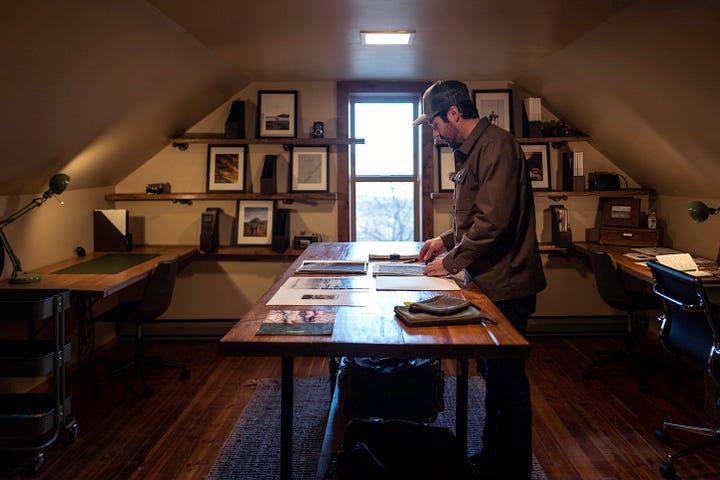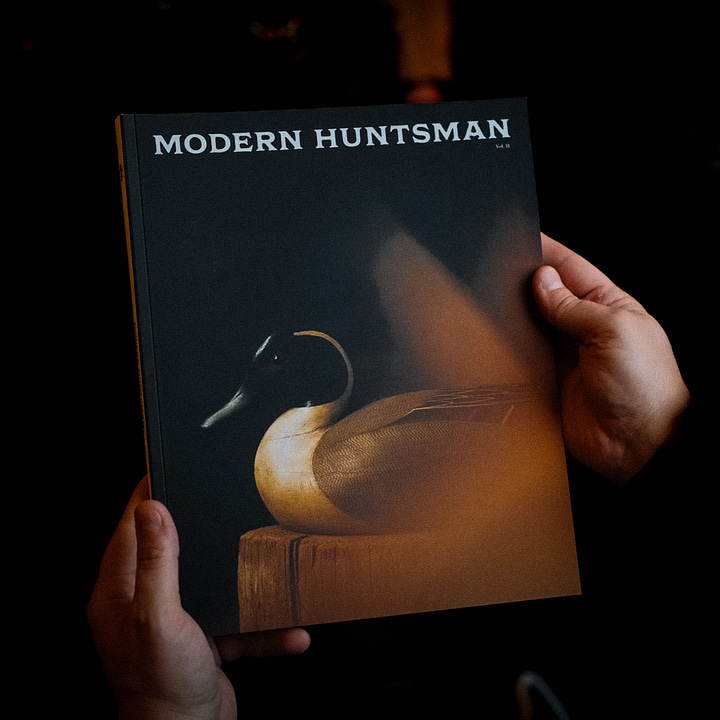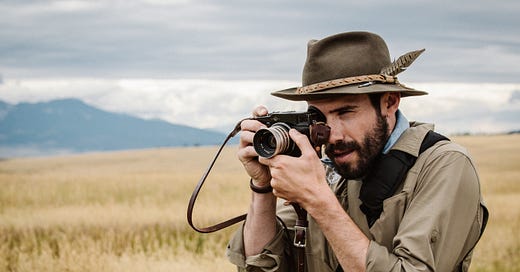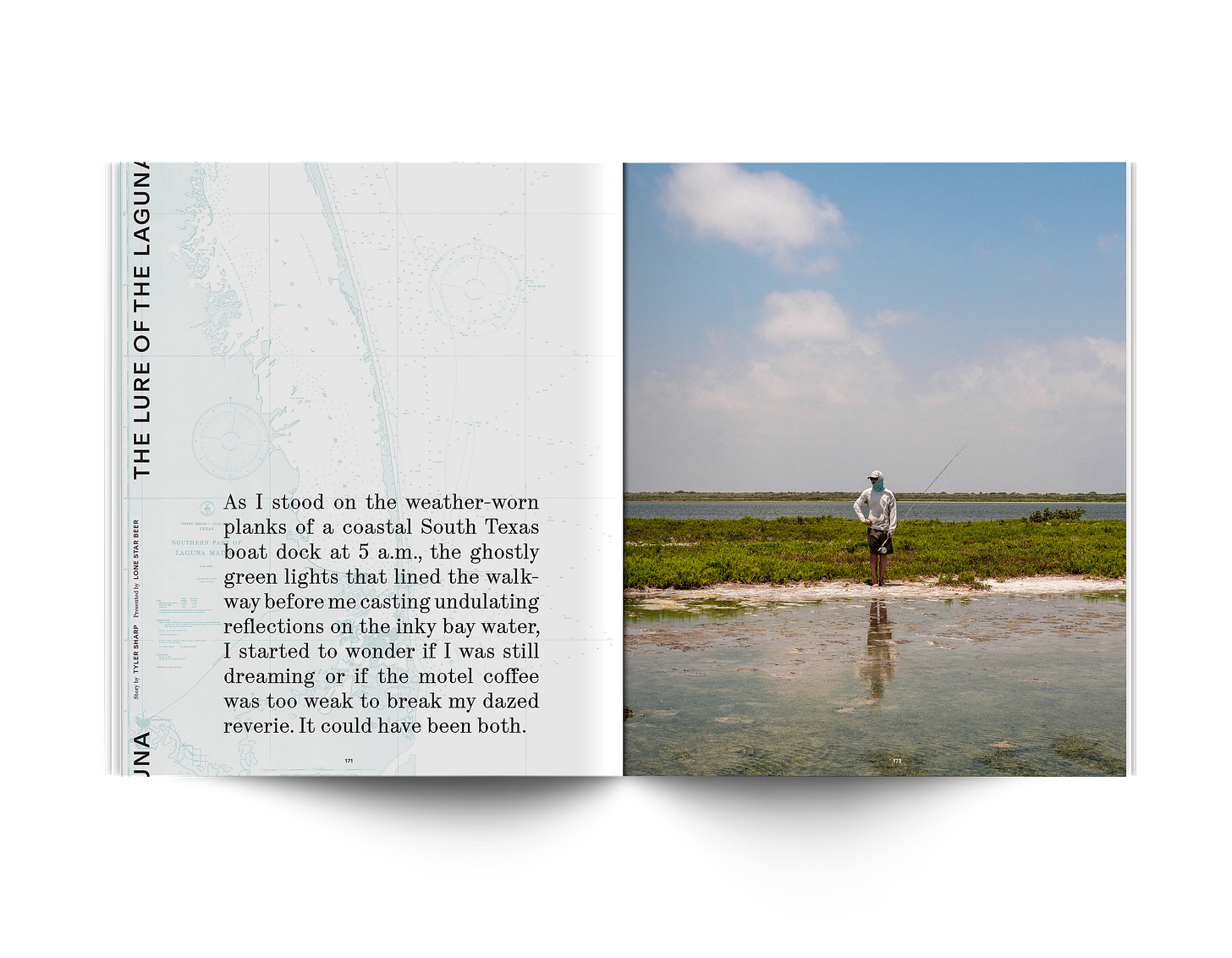A Photographer and Filmmaker’s Experience of Entrepreneurship: Interview with Modern Huntsman Founder, Tyler Sharp
Tyler Sharp is the CEO and founder of Modern Huntsman, a lifestyle brand and publication whose mission is to positively impact the perception of hunting in modern society by highlighting the stories of artists, hunters, conservationists, anglers, and naturalists who are focused on the sustainable use of our wild resources.
Prior to founding Modern Huntsman, Tyler was a freelance photographer, writer, director, and creative consultant working with top outdoor brands such as Stetson, Filson, Tecovas, and Shinola. He ultimately left his freelance career behind to go all in on building Modern Huntsman. In his words, “The opportunity to do something that really hadn’t been done was appealing.”
I wanted to know more about his experience, as a person and as a creative, building a business born out of passion. What was it really like for him to go all in on the building of Modern Huntsman? How does he create space for creativity while also navigating the demands of business building? What mindsets help him push through the hard moments of entrepreneurship? How does he identify the feeling of emotional resonance and passion that kickstart all of his projects?
In the conversation, we spoke about:
What it was like to make the leap from his prior career as a freelance creative to founding Modern Huntsman
What keeps him going in tough moments
How he approached building something that confronts preconceived notions and opinions
Navigating business building with making space for creativity
What emotional investment looks and feels like for him
What’s next for Modern Huntsman
Note: The following interview has been lightly edited for clarity and length. While every effort has been made to preserve the integrity of the conversation, please be aware that the quotes may not be verbatim but reflect the essence of the dialogue.
What are you up to in life right now?
I run a media company and lifestyle brand called Modern Huntsman. It’s been six, almost seven years since we started. I walked away from a fairly successful and lucrative creative career as a director and photographer to start this. A lot of my experience with brands and publications in the past revolved around the outdoors, fishing, hunting, and conservation. I saw what I felt was a communication gap between people who hunt and those who don’t. There was a lot of misinformation and miscommunication and, in my opinion, a lot of organizations in the hunting industry weren’t doing a good enough job of communicating the merits of sourcing your own food and of hunting’s role in conservation. It started as a bi-annual publication and has since evolved into a creative studio, an experiential adventure trip company, and several other things. We’ve become curators and tastemakers in a sense. There’s also a nonprofit component - we do consulting and lead conservation symposiums, panel discussions, and other projects aimed at bridging the gap between different industries and different mindsets. We present that information in an artistic, more poetic or philosophical way than you were seeing in that media space before.
Right now, I wear six or seven hats. I’m the founder, the CEO, the editor-in-chief, the creative director, head idiot…whatever else you want to say. I went to film school at USC, and I’m a creative at heart. Eventually, I was thrust into a role of ownership and business management, and I’m being forced to learn a lot of difficult things that I wasn’t trained for and don’t particularly enjoy. That’s been difficult. When you care about something, how do you keep it going and keep yourself going? This is getting existential. What I’m up to every day is waking up and trying to figure out how to keep myself as a person, and as a creative, fulfilled and separate from this business that has taken complete control of my life and energy. I’m 100% in a business gauntlet. It’s a tough space in general - publishing is. The general landscape of the economy is as well. The hardest part for me is trying to keep the creative side alive and finding ways to still focus on the things that I love when, right now, I’m mostly doing things that are required of me.
You mentioned walking away from your prior life as a director and photographer to start Modern Huntsman. What was that actually like for you to make that leap?
I was much younger. It was a passion play. One of my greatest strengths is being a connector of people, talent, and relationships. The opportunity to do something that really hadn’t been done was appealing. I was looking for more stability. Looking back and knowing what I know now, I don’t know if starting a print publication would have been the most lucrative situation to enter into. It wasn’t a business decision. It was a creative opportunity decision. It’s funny because every once in a while I’ll do a photography job that pays really well and my fiancee will ask, “Why are you not doing more of this?” I still do a lot of creative work for other brands but it’s under the name of Modern Huntsman. I’m thinking about outside projects a lot more now that I’m at a stage in the business where it’s growing and becoming something bigger than what I can manage on my own. What does it look like to bring on investors or strategic partners that take some of the work off my plate and allow me to exclusively focus on the creative side, or have more bandwidth as a human being to go do other projects?
What keeps you going in the moments when you’re at the end of your rope or you’ve had a tough day?
My word really is my North Star…the obligations I have to partners and clients and friends and colleagues. When I say I’m going to do something, I do it. That’s kind of been the story for a few years now. We have subscribers and supporters that believe in what we’re doing, and that’s not something I take lightly. There are some incredible people on our advisory board, who are highly respected, internationally successful people in the creative and publishing space. As one example, Chip and Joanna Gaines invested and are on our advisory board. These are people who believe in what we’re doing and see the opportunity. I think that is what helps keep me at a baseline of “Yes, this is a real thing. Yes, it’s hard. Maybe it’s just around the corner.” I spoke with Chip the other day and he told me that in the one and only marathon he’s ever run, it was mile 18 or 19 where he wanted to quit but didn’t. He pushed through and ended up having a really rewarding experience in the end. Sometimes you have to just keep pushing.
That’s kind of it - understanding that I’m at a difficult part in the journey of this business. I’m trying to grow and change without compromising what we’ve built up until this point. I know enough about myself to know that I shouldn’t be doing all the administrative, financial, and business development stuff as much as I am. There are a lot more people who are better suited for that, but they would need to be someone who understands who we are, what we’ve built, and where we’re trying to go for me to pass that off. It can’t just be someone who will look at it from a spreadsheet perspective. In a world of targeted ads and AI listening to what you say and people making millions of dollars off of TikTok, the way we are doing it is much harder. I refuse to compromise that and try to keep as much transparency as I can around what we’re doing, the challenges we’ve faced, what we see ahead, and how we hope people will be a part of that.
What was it like for you to put yourself out there and take on this project where you knew you would be confronting a lot of preconceived notions and attitudes from the outset?
I’ve always been a diplomat. I’ve always been interested in figuring problems out and bringing people together. I knew that would be a big part of it. I’m a type 2 Ennegram which is the helper - a big part of that is that it’s important to me to be well-liked. I like to get along with people. I go to great lengths to develop relationships, be honest and genuine, do the right thing, and take the high road. That doesn’t always work. Sometimes it has nothing to do with who you are. I think that was something I underestimated about me being in this position and underestimating people naysaying and talking shit. That’s been challenging for me to separate from as an individual. I’m the founder and face of the brand, and it’s difficult for me to be that and not take that stuff personally as an individual.
I’m a fighter philosophically and have trained in martial arts for the past 20 years, and part of that training is wanting to fight the good fight. However, I am definitely business battle-weary. I’ve had to learn to shift the mentality and not measure myself as a person based on the success of what we’ve set out to do as a business and philosophical mission. That’s hard to measure. I remember some of my advisors in the beginning saying, “How are you going to prove this?” It’s been hard to fight for something for so long that doesn’t necessarily have a very clear or measurable goal. But there are different metrics of success. From a business perspective, we’re a profitable, sustainable company. From a mission standpoint, I feel like we have been successful, but on what scale? It’s hard to tell. I do know that the 11, now almost 12, books that we’ve published, and the films and podcasts that we’ve done, have been received really well. Yes, that has absolutely been successful. I think there are few people who would argue with the statement that we are the creative leaders in the space. People look at what we do for inspiration and often times as something to copy. We’ve lifted up voices, individuals, and artists that we felt weren’t getting enough exposure or appreciation. To see some of those people’s careers evolve and improve has been rewarding.


What have you found helps you creatively recharge when you have so many demands on your time and the business building day-to-day?
I don’t know (laughs). Honestly, the straight answer is that I don’t feel like I’m tapped into it right now. I’ve been pretty aggressively pruning my Instagram feed - unfollowing, muting, trying to get to a point where what I’m looking at, in the limited time that I’m on there is something that inspires me. That’s what it used to be and is not anymore.
Looking back through previous issues and reminding myself that the travel I’ve been able to do and the trips, like the one we hosted in Scotland last year with 18 guests, have been rewarding and inspiring. The artists and photographers and writers we work with are also a big part of it for me. I’m trying to prioritize time to sit down and create for myself. For instance, I was in Kenya and Tanzania last year, where I got engaged, and I haven't really edited any of those photos. But I shot several stories, including a chef feature from a woman who has a really famous cookbook. Even if it’s just editing one photo and writing five sentences trying to communicate what that experience was helps.
I have a 90-day planner that I use. Every day I try to use that and be creative in some way. Reading is another thing for me, just picking up a magazine or a book. I’m analog - when I write stories, I write them physically on paper with a fountain pen first. It might save me time if I didn’t do that. I have some friends in LA who are screenwriters, and they write their stories on a computer or a typewriter. I told them, “Technically you’re not writers. You’re typers.” They didn’t really like that! I’m a writer who writes things down on paper.
Emotional investment and passion seem like a big part of not only how you started Modern Huntsman, but a big part of how you live your life. How do you know when you’re emotionally invested? What does that feel like for you?
It’s hard to describe that. The things I'm inspired by or choose to invest in have to come from emotional connection. A lot of what I’ve chosen to focus on is within a certain range, even if it appears disconnected. Some people then ask questions like, “What the hell does surfing have to do with hunting?” We just published a surfing story by a really famous writer who passed away recently. Our ability to weave what would otherwise seem like very obscure things together is that connective thread.
I also get hit up by a lot of people (and I apologize to anyone reading this who I haven’t responded to), but if I’m not immediately interested or excited by it, then I don’t jump on it. I don’t have a formula for that but maybe I should. If I knew what that was and could explain clearly, “Hey, these are things that I’m really interested in developing and publishing” and we put that out there as a call for entries, that might be a way to get a lot of great work. I don’t know how to pinpoint exactly what that emotional connection is.


What’s next for you?
We’re in an active fundraise that would involve launching several other aspects of the business, some of which are already in motion. After so many years of publishing stories about faraway lands or local nearby places and the adventures that happened therein, people started to ask, “Well, why do you get to have all the fun? Why can’t we go?” There is increasingly more interest in that, so we are starting to roll out some of those experiences both overseas and domestically, with fishing, hunting, and wild food dinners. I’ve been executive producing a handful of films with Swarovski Optik, Lone Star Beer, and with a company called Moultrie Mobile. I don’t think of those as just films. I think of them as entire campaigns with breadcrumbs along the way showing what we’re doing, what it’s leading to, and including podcasts that give more information about it, as well as print stories that show behind-the-scenes stuff. I’m viewing this all from a more holistic perspective - if I can only do so many trips a year, how do you do encompassing storytelling around all of it?
On the publishing side, we signed a deal with Penguin Random House and are actively working on our first cookbook, which we will finish by April. It won’t be released until 2025 - waiting that long to publish is a new thing. It’s been interesting to adjust our wild west ways of doing whatever the hell we want all the time to working with a very established publisher. They’ve been amazing. They’ve given us lots of grace and slack to do what we do. I basically asked them what rules we absolutely had to follow, and said we planned on breaking the rest. I think it was refreshing to them as well to do something a little bit different.
Another minor task is planning a wedding, haha. Fortunately, my fiance is super understanding and gracious with where we’re at in this stage of the business. Between all of that, finding time to sleep whenever the caffeine wears off.





